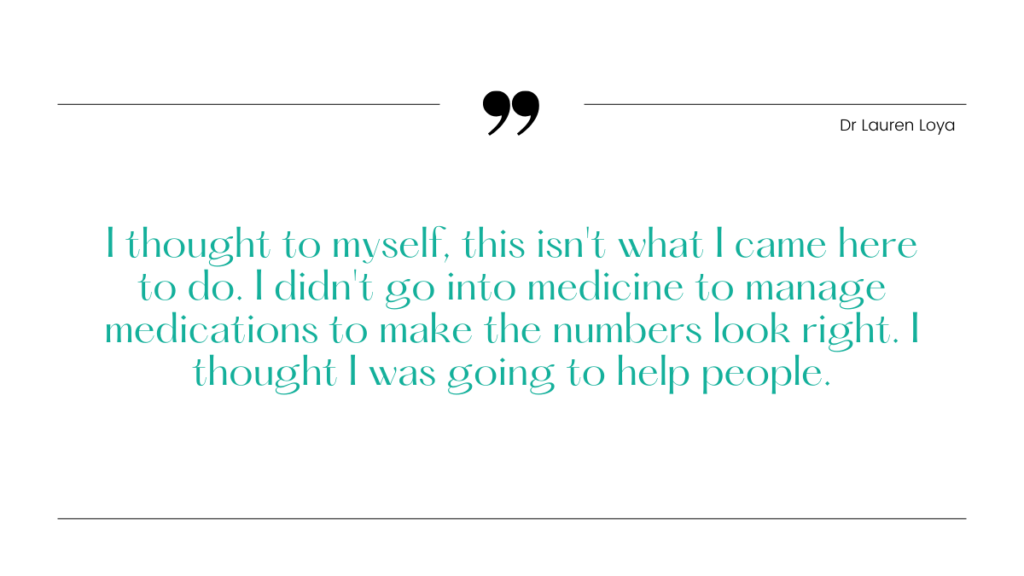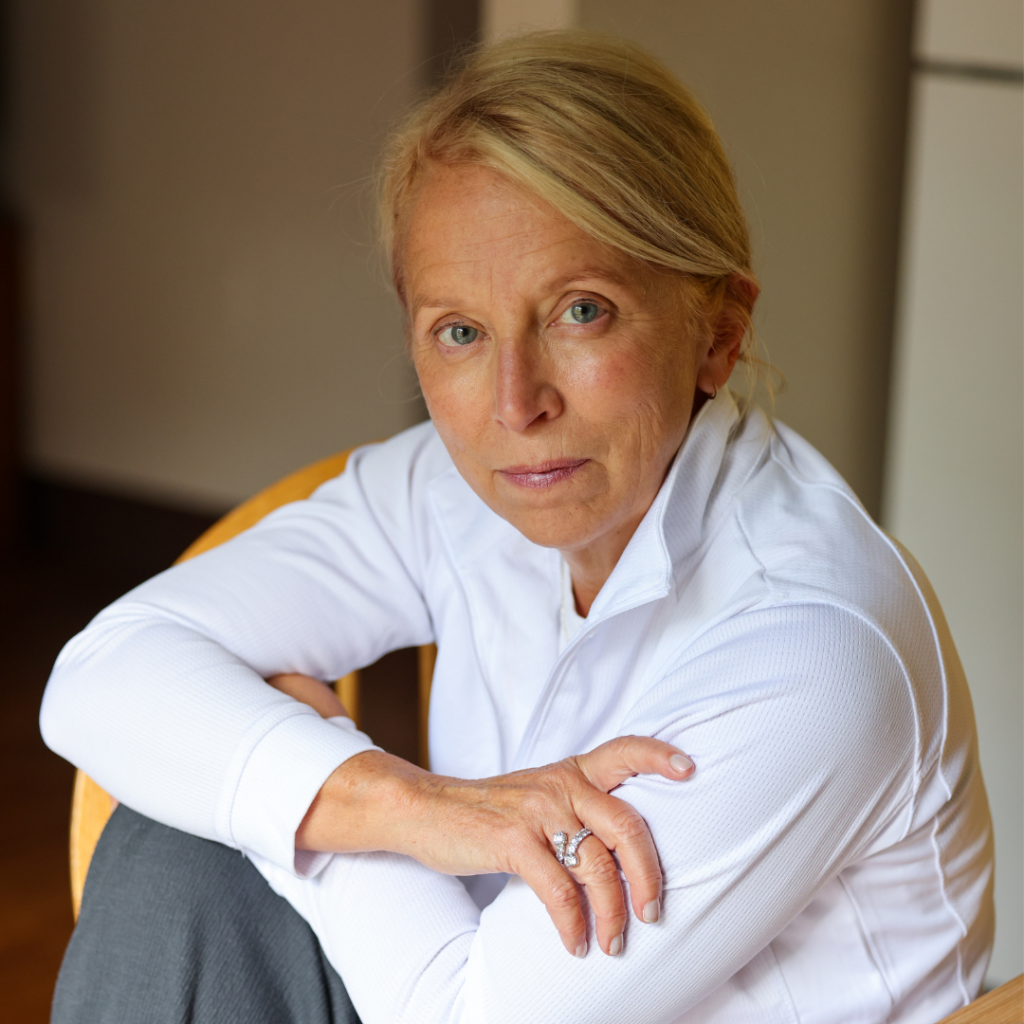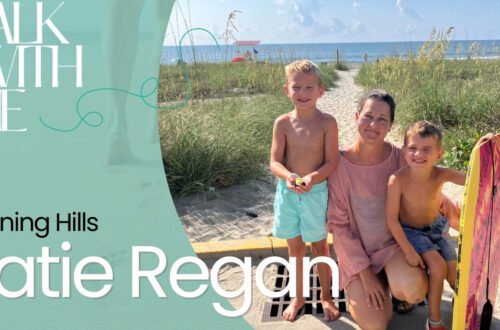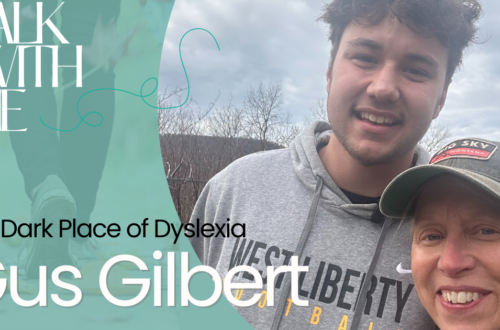After I graduated from college, my mom stitched me a starfish with the caption “It makes a difference to this one.” It was a reference to the starfish story as told by the Honorable Andrew Young at my Baccalaureate. She heard it as my calling. In her mother’s heart, he was speaking directly to me. “Make a difference – one child at a time.”
35 years later I have met a soulmate in this call to service… an inspiring female doctor who changes the trajectory for a life… one patient at a time. Dr. Lauren Loya is reshaping the way to think about healthcare in her mission to address medicine with a more personalized touch.
The pivotal moment came when she met a patient turning 60, who had been prescribed 13 different medications. Though the patient’s lab results looked perfect, she felt anything but. Dr. Loya remembers, “She was tired, she couldn’t sleep, she had back pain, she was depressed. And I looked at her labs, as I’ve been taught to do, and they are all normal. I have her on all the right medications for her high blood pressure, her diabetes, her cholesterol, etc. Her numbers look great. I realized I had no tools to deal with her lack of vitality and her feeling of poor health.” There was a crucial gap between clinical data and actual patient well-being. She recognized that the system was more focused on treatments that generate revenue, like medications, tests and surgeries, than preventative care. Trained traditionally in family medicine, Dr. Loya realized she was merely managing symptoms rather than truly helping her patients achieve wellness. “I thought to myself, This isn’t what I came here to do. I didn’t go into medicine to manage medications to make the numbers look right. I thought I was going to help people.”
Following her epiphany, she ventured into integrative health—a field that combines traditional medicine with lifestyle and holistic approaches. She sought to offer more than just prescriptions, delving into nutrition, supplements, and lifestyle changes to genuinely improve health outcomes. Yet, she remained an outlier in her field. This realization drove her to create a practice where the focus was on listening to individual patients and addressing their personal needs. Thus The Hormone Center was born.
I couldn’t help but draw similarities in our journeys. Without a diagnosis, there was little support for the patient. Substitute the word “student” for “patient” and we are now telling my story in education. It is not about the diagnosis. It is about the child. I was not in the business of surviving school. How could I focus on the learner with our current system?
For me, I focused on cultivating a culture of possibility and innovation at Wheeling Country Day School. It wouldn’t change the educational system, but it would serve the children and the teachers within our school community. For Dr. Loya, she similarly transformed her own practice.

There comes a point, however, when you feel like you aren’t doing enough. Yes, you are making a difference to one person, but the impact could be so much greater. Each of us had to ask ourselves, were we willing to take the risk to expand our reach? Were we going to step out and be a leader in disrupting the larger system?
Dr. Loya started training others to join her practice locally. By mentoring others, she quadrupled her practice’s capacity, ensuring more people could benefit from her patient-centered approach. By sharing her knowledge and experience, she amplified her impact. Now she is casting a wider net to train other practitioners to extend this focus on health and wellness in treating people not symptoms. It’s a reminder that change often starts with one person refusing to accept the status quo. By focusing on what truly matters—people’s well-being—this doctor is making a difference, one patient at a time.
As we discussed menopause and IVF, and the damaging misinformation around both, the need for women to share their stories to disrupt the system in support of other women was palpable. I could feel the nudge of the starfish to tell my own stories – even if it helped only one woman through her journey to motherhood and beyond.
In case it is not clear, being a mom is replete with moments of doubt and self-reflection, no matter who you are professionally. Even as a physician, there were countless times Dr. Loya questioned her abilities as a mother, seeking validation from external sources. “My mom died six weeks before my first child was born. I often feel lacking because I never had her to ask things. How do I know I’m doing the right things? My dad always said, ‘You’re a great mom.’ My husband said it on and on and on. And so I believe that must be true. But I don’t ever say it to myself. I always see where I am lacking.”
Still, we can learn to recognize small victories—pause during those moments and give ourselves a little credit.
One of the most profound lessons is the importance of being present – just listening. When Dr. Loya’s daughter faced social challenges on the playground, she realized the best thing she could do was simply acknowledge the child’s feelings. “I mean, what was I going to do? Go to the school and say, ‘Hey, school principal, like, these girls won’t let my daughter play with them at playtime.’ I don’t know. That just didn’t seem like the solution.” As a school leader, I couldn’t agree more. I wish more parents practiced such presence. Dr. Loya focused on listening to her child. “All I could really do was say, ‘Wow, that really sucks.’”
Maybe that’s the parenting refrain we should teach. “That sucks.”
After I learned Nicolas had no heartbeat, I had to make quite a few phone calls to friends and family. It was excruciating – reliving his loss over and over again. Then I reached my mom. Her response was exactly what I needed. “Shit. That sucks.”
I doubt it was her lifelong career in medicine that prompted such a response. It was her honesty, her vulnerability and her humility. This wasn’t about her or how she should respond. This wasn’t anything she could fix. She didn’t have to put her stamp on it. Whatever made her say that, it was scripted beautifully.
As the trail ended, so did our conversation.
Liz: I think that’s something else we share. You have people’s lives in your hands. I felt like I had people’s futures in my hands. I couldn’t give up on a child. I had to find a way to help them. But I think that filters into other aspects of your life where you feel like you have to provide a solution, a fix, and sometimes you can’t.
Lauren: You can’t.
Liz: Even as a mom.
Lauren: Even as a mom.
The best we can do is remember that we can make a difference – one life at a time – sometimes just by listening. And if necessary, follow the wisdom of Virginia Dulany, and simply respond, “That sucks.”





